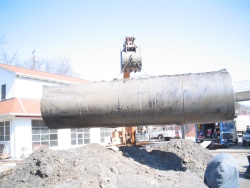 Within the DEP, the Environmental Enforcement (EE) staff are responsible for the inspection and enforcement of activities monitored by the DEP’s Division of Water and Waste Management. EE has inspection and enforcement protocols for dam safety, hazardous waste, underground storage tanks, and water and waste. Each of these protocols addresses inspection, enforcement, citizens’ complaints, and spills/emergency responses. However, while the majority of contamination problems in the Upper and Lower Kanawha Watersheds are a result of coal-related practices, both the dam safety and water and waste protocols intentionally exclude coal-related issues from their inspection and enforcement criteria.
Within the DEP, the Environmental Enforcement (EE) staff are responsible for the inspection and enforcement of activities monitored by the DEP’s Division of Water and Waste Management. EE has inspection and enforcement protocols for dam safety, hazardous waste, underground storage tanks, and water and waste. Each of these protocols addresses inspection, enforcement, citizens’ complaints, and spills/emergency responses. However, while the majority of contamination problems in the Upper and Lower Kanawha Watersheds are a result of coal-related practices, both the dam safety and water and waste protocols intentionally exclude coal-related issues from their inspection and enforcement criteria.
Coal-related issues are regulated by the WVDEP’s Division of Mining and Reclamation, as well as by the Office of Abandoned Mine Lands and Reclamation. In 2010, the WVDEP released the Permitting Guidance for Surface Coal Mining Operations to Protect West Virginia’s Narrative Water Quality Standards, which is an attempt to assist permit writers in “developing site-specific NPDES permit conditions for surface coal mining operations using a holistic watershed monitoring approach through the use of biological and chemical monitoring, whole effluent toxicity testing, and the development of Aquatic Ecosystem Protection Plans.” This document utilizes adaptive management techniques to protect water quality standards, emphasizing the assessment and re-assessment of permit plans to see what strategies are the most effective. While this adaptive, place-based management strategy seems effective in theory, it has clearly not been as successful in practice. Despite having regulations put in place to prevent point- and nonpoint sources of acid mine drainage for decades, the Kanawha Watersheds still face high levels of pollutants from active and abandoned mines. It seems as if the failures in management policy and pollution prevention are more a result of enforcement failures than policy failures. Enforcement failures may be, in part, the result of a lack of communication between the two WVDEP divisions that are responsible for managing water quality.
In addition to failures in the enforcement of mining policies, the WVDEP’s protocol for underground storage tanks claims to require compliance inspections on all active storage underground storage facilities. It is important to note that this protocol fails to mention inspections for aboveground storage tanks, such as the one used by Freedom Industries. Additionally, as evidenced by the case of the Freedom Industries spill, it is evident that storage tanks are rarely, if ever, actually inspected after they are initially installed, regardless of enforcement protocols. According to a recently retired senior WVDEP official, Pam Nixon, the WVDEP is constantly being pressured by local government officials and large corporate interests to scale back its enforcement of Clean Water Act Policies (Osnos, 2014). She argued that local officials continue to emphasize “compliance assistance” over heavy-handed enforcement. Compliance assistance, according to Nixon, means that the DEP’s top priority in the face of a problem will always be to keep the company in operation (Osnos, 2014). This unofficial policy becomes apparent in the WVDEP Clean Water Act enforcement statistics reported by the Charleston Gazette in 2008. According to Osnos (2014), “the Charleston Gazette discovered that in a nearly five-year period coal companies had self-reported around twenty-five thousand violations of the Clean Water Act, but he DEP had not reviewed the reports or issued a fine.” In response to this statistic, DEP inspectors argued that the process of issuing an evaluation is very time consuming, and there is simply just not enough time for them to enforce every violation.
References
Osnos, E. (2014, April 7). Chemical Valley. The New Yorker. Retrieved from http://www.newyorker.com/reporting/2014/04/07/140407fa_fact_osnos?currentPage=all.
